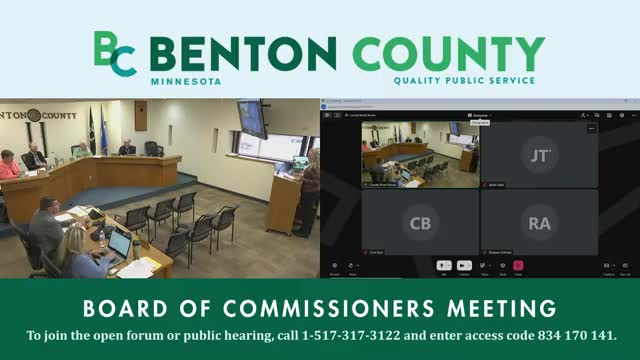Federal shutdown threatens SNAP, MFIP and WIC benefits; Benton County social services report immediate fallout
Get AI-powered insights, summaries, and transcripts
Subscribe
Summary
Human Services staff told commissioners that a continuing federal government shutdown would halt November SNAP and MFIP approvals, affecting roughly 1,931 SNAP cases and 178 MFIP cases; county staff said WIC food and administrative funding are funded only through mid-November as of the latest federal/state notices.
Benton County Human Services and Public Health staff warned commissioners that a continuing federal shutdown is already disrupting food and cash assistance programs for county residents and could affect program staffing reimbursements.
Human Services staff said the U.S. federal shutdown has immediate operational effects: Department of Children, Youth, and Families (DCYF) began notifying recipients that MFIP (Minnesota Family Investment Program) cases with processing dates on or after Oct. 29 cannot be approved; SNAP (Supplemental Nutrition Assistance Program) approvals with process dates on or after Nov. 1 similarly cannot be approved if the shutdown continues. Staff reported 1,931 active SNAP cases in Benton County and $452,000 in SNAP benefits issued to county recipients in September. For MFIP, staff reported 178 active cases and $193,000 issued in September.
Public Health staff separately reported that reinstated federal COVID-funded grants have been offered to local health departments, but the award is time-limited: MDH indicated the grant could be invoiced through March 31 and that the county would invoice for purchases it can complete before that deadline. Public Health also said WIC (Women, Infants & Children) program food funds of $3,000,000 and $1,300,000 in administrative funds were made available in one tranche that the state expects will carry the program through mid-November; WIC in Benton County serves roughly 800 participants monthly and invoices for staffing each month.
Board reaction: Commissioners expressed concern about the human impact if SNAP and MFIP benefits stop and asked staff to estimate county costs if federal administrative reimbursements stop. Staff said past shutdowns tended to result in retroactive reimbursements, but county budgets might have to absorb short-term costs if reimbursements are delayed or not paid.
Why it matters: SNAP, MFIP and WIC are key safety-net programs for low-income households. Interruptions to benefits can immediately affect food security. The county also relies on federal reimbursement for staffing; reimbursement uncertainty risks county general funds and could require policy decisions from the board.
Staff follow-up: Human Services agreed to estimate the county—s potential financial exposure for the board (administrative costs and staff-time reimbursements) for the October-December period and return with figures.
Provenance: SNAP/MFIP case counts and WIC participation numbers were provided by Human Services and Public Health staff during the meeting; transcripts record the exact case counts and dollar amounts discussed.
